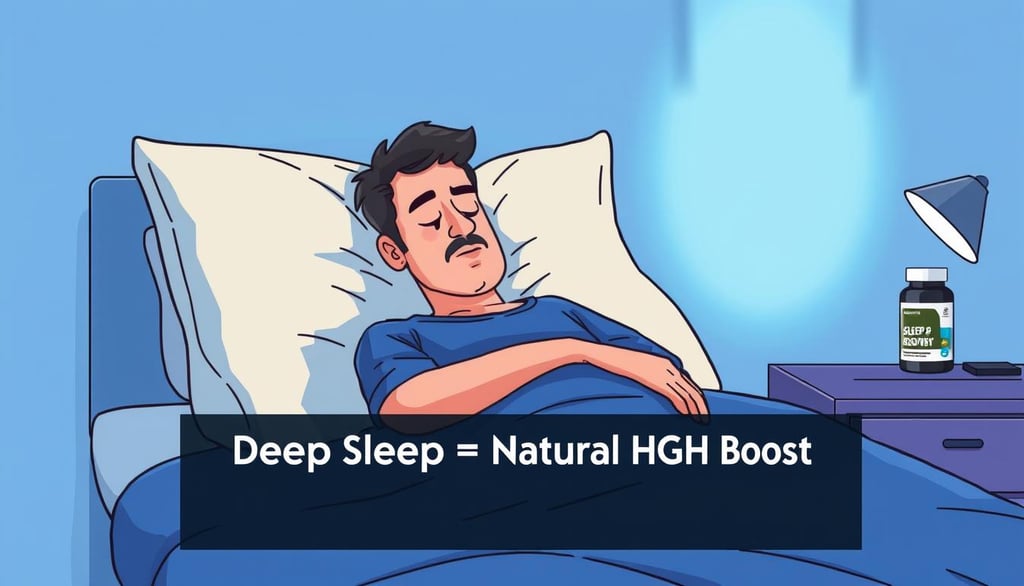What are some proven tips for how to increase hgh naturally?
Boost HGH naturally with proven tips on diet, exercise, sleep, and lifestyle. Learn effective strategies to optimize your growth hormone levels.
MUSCLE BUILDING & WORKOUT
ActiveVitaLife
5/20/20258 min read
Natural Ways to Boost Human Growth Hormone (HGH) Levels
What if the key to better energy, muscle strength, and overall vitality lies in a hormone your body already produces? Human growth hormone (HGH), also known as somatotropin, isn’t just for kids. This powerful hormone supports muscle growth, metabolism, and even healthy aging in adults.
Your body releases HGH in pulses, primarily during sleep and exercise. But factors like stress, poor diet, and inconsistent sleep patterns can disrupt this natural rhythm. Optimizing your HGH levels doesn’t require extreme measures—simple lifestyle adjustments can make a big difference.
Research shows natural methods like nutrient-rich meals, high-intensity workouts, and quality sleep significantly influence growth hormone production. These strategies not only align with your body’s biology but also promote long-term wellness. Ready to unlock your body’s full potential?
Key Takeaways
HGH supports muscle growth, metabolism, and cellular repair in adults
Natural production declines with age but can be influenced through lifestyle
Sleep quality directly impacts growth hormone release cycles
Specific exercises and dietary choices enhance HGH naturally
Consistent routines yield better results than quick fixes
Understanding Human Growth Hormone
While often associated with childhood development, human growth hormone (HGH) plays vital roles throughout life. Produced by the pituitary gland, this protein-based hormone—also called somatotropin—fuels cell regeneration, muscle maintenance, and metabolic efficiency. Think of it as your body’s repair crew, working behind the scenes to keep tissues healthy and energy levels stable.
What Is HGH and Its Role in the Body
HGH acts like a master coordinator. During youth, it drives bone growth and organ development. As adults, it shifts focus to metabolism regulation and body composition. Research shows it helps convert stored fat into energy while preserving lean muscle mass. A 2020 study noted adults with balanced HGH levels maintained healthier body fat percentages compared to those with deficiencies.
How HGH Affects Growth, Metabolism, and Body Composition
This hormone doesn’t just influence weight loss—it reshapes how your body uses nutrients. High HGH levels correlate with faster recovery after exercise and better insulin sensitivity. However, sugary snacks and processed carbs can spike insulin, which reduces HGH secretion by up to 50%, according to clinical trials.
"Optimal HGH levels support metabolic flexibility, allowing the body to switch efficiently between burning carbs and fats."
Maintaining balanced HGH isn’t just about appearance. Low levels are linked to weaker bones, reduced stamina, and slower healing. Simple choices—like prioritizing protein-rich foods and avoiding late-night sweets—help keep this hormone working in your favor.
The Science Behind HGH Production
Your body’s control center for HGH production lies in a pea-sized powerhouse—the pituitary gland. This tiny brain structure releases human growth hormone in bursts, typically every 3 to 5 hours. These pulses peak during deep sleep and intense physical activity, creating natural rhythms that fuel cellular repair and growth.
Hormonal Regulation and the Pituitary Gland
The pituitary gland acts like a precision thermostat for hormone balance. It responds to signals from the hypothalamus, releasing growth hormone-releasing hormone (GHRH) to stimulate HGH production. Conversely, somatostatin—a braking hormone—slows secretion when levels get too high. Research shows this delicate dance maintains optimal hormone levels for metabolic health.
Impact of Body Fat and Insulin on HGH Secretion
Excess body fat doesn’t just affect your waistline—it disrupts hormone harmony. Fat cells, especially visceral fat, release compounds that interfere with HGH production. A 2021 study highlighted that individuals with obesity produced 50% less growth hormone than those with healthy body fat percentages.
Insulin spikes pose another challenge. When blood sugar rises, insulin works overtime to manage glucose. This process temporarily shuts down HGH secretion—a survival mechanism dating back to our evolutionary past. Medical News Today reports that reducing refined carbs can help normalize both insulin and growth hormone patterns.
“Lower levels of HGH correlate strongly with metabolic syndrome markers, creating a cycle that’s tough to break without lifestyle changes.”
Clinical trials reveal good news: shedding even 10% of body fat can revive sluggish HGH production. Pairing smart nutrition with regular movement creates the ideal environment for your pituitary gland to thrive.
How to Increase HGH Naturally
Elevating growth hormone levels doesn’t require complex protocols—just smart, science-backed habits. Recent studies highlight specific approaches that trigger significant surges in your body’s natural production.
Effective Strategies and Evidence-Based Methods
High-intensity interval training (HIIT) sparks immediate growth hormone responses. A 2023 study found 30-minute sprint sessions increased HGH by 450% compared to steady-state cardio. Pair this with resistance training—deadlifts and squats create micro-tears that demand cellular repair, stimulating hormone release.
Intermittent fasting offers another powerful lever. Research shows fasting for 12-16 hours boosts HGH secretion by up to 1300% in women and 2000% in men. This aligns with evolutionary patterns where food scarcity signaled the body to prioritize repair over growth.
Targeted supplements amplify these effects. Arginine and glutamine—amino acids found in nuts and eggs—enhance exercise-induced HGH spikes when taken pre-workout. A 2021 meta-analysis noted 60% greater hormone elevation in athletes using these nutrients versus placebo groups.
“Natural methods work synergistically—combining fasting with resistance training creates a 3x greater HGH surge than either approach alone.”
Unlike synthetic hormone injections, these strategies carry minimal risk while supporting overall health. Consistency matters most: aim for 3 weekly HIIT sessions and 7-8 hours of quality sleep to maintain optimal levels.
Nutritional and Lifestyle Changes for Boosting HGH
Your plate holds more power over hormone balance than you might realize. Strategic diet adjustments create ideal conditions for growth hormone secretion while improving overall quality of life. Let’s explore practical ways to nourish your body while supporting optimal HGH levels.
Reducing Sugar Intake and Managing Carbs
Sweet treats sabotage hormone harmony. Research shows consuming 75g of sugar slashes HGH secretion by 50% for up to two hours. Refined carbs like white bread trigger similar insulin spikes, creating a hormonal roadblock.
Prioritize complex carbohydrates instead. Quinoa, sweet potatoes, and oats release energy slowly. This stabilizes blood sugar and keeps insulin levels steady—a crucial factor for maintaining natural growth hormone rhythms.
Intermittent Fasting and Glutamine-Rich Foods
Intermittent fasting acts like a reset button for hormone production. Studies reveal 16-hour fasting windows increase HGH by 1300% in women. This practice mimics ancestral eating patterns, signaling your body to prioritize repair and fat burning.
Pair fasting with glutamine-packed food choices. Spinach, bone broth, and grass-fed beef provide this amino acid that enhances cellular energy production. A 2022 trial found participants combining fasting with glutamine-rich meals achieved 23% lower body fat percentages than control groups.
"Strategic eating windows coupled with nutrient-dense foods create a double boost for growth hormone activity."
Practical changes yield lasting results. Try finishing dinner by 7 PM and breaking fast with protein-rich breakfasts. Swap afternoon candy bars for mixed nuts. These tweaks support weight loss while creating an internal environment where HGH thrives.
Exercise and Supplement Strategies for HGH Enhancement
Sweat sessions and smart supplementation form a powerful duo for hormone optimization. Structured workouts paired with targeted nutrients create a biochemical environment that amplifies your body’s natural HGH production. Let’s break down the science behind these strategies.
High-Intensity Workouts and Resistance Training
HIIT workouts trigger immediate growth hormone surges. A 2022 study revealed 30 minutes of sprint intervals boosted HGH levels by 450% compared to moderate exercise. Resistance training—especially compound lifts like deadlifts—creates muscle tension that signals your pituitary gland to release more hormone.
Why does intensity matter? Lactic acid buildup during vigorous exercise stimulates growth hormone-releasing hormones. Sessions lasting 45-75 minutes yield the best results, while marathon workouts (over 2 hours) may lower production due to cortisol spikes.
“Short bursts of intense effort followed by rest periods mimic the stress-recovery cycle that optimizes HGH release.” – Journal of Sports Science
Arginine supplementation magnifies these effects. Clinical trials show taking 5g of this amino acid pre-workout elevates post-exercise HGH by 60%. Pair it with sports drinks containing branched-chain amino acids (BCAAs) to sustain energy without spiking insulin.
Action steps for maximum impact:
Schedule 3 weekly HIIT sessions
Incorporate heavy squats or bench presses
Take arginine 30 minutes before training
Limit workouts to 75 minutes
Optimizing Sleep and Recovery for HGH Production
Your nightly rest does more than recharge your energy—it’s prime time for cellular renewal. During deep sleep cycles, the pituitary gland releases up to 75% of daily growth hormone, according to sleep medicine research. Missing these critical windows disrupts metabolic health and muscle recovery.
Sync With Your Body’s Clock
Consistency matters more than duration. Going to bed and waking at the same time daily stabilizes your circadian rhythm, enhancing sleep quality. A 2023 study found adults with regular schedules produced 40% more growth hormone during early sleep stages than erratic sleepers.
The CDC recommends 7-9 hours nightly for hormone balance. Create a wind-down routine: dim lights 90 minutes before bed, swap screens for books, and keep your bedroom cool (60-67°F). These tweaks signal your brain to release melatonin naturally.
Harness Nighttime Repair Mode
Melatonin doesn’t just regulate sleep—it amplifies HGH secretion. Research shows supplementing with 0.5-3mg melatonin before bed can deepen restorative sleep phases. However, focus first on natural production through darkness exposure and magnesium-rich foods like almonds and spinach.
“Participants prioritizing sleep consistency saw 28% higher growth hormone levels within two weeks.” – Journal of Clinical Endocrinology
Simple upgrades make big differences:
Use amber nightlights instead of blue-toned bulbs
Try blackout curtains for pitch-dark environments
Avoid heavy meals within 3 hours of bedtime
Quality rest isn’t a luxury—it’s biological maintenance. By aligning your habits with your body’s natural rhythms, you create the ideal conditions for cellular repair and vitality.
Conclusion
Optimizing your body’s growth hormone production isn’t about quick fixes—it’s about sustainable choices. Decades of research confirm that combining smart nutrition, strategic exercise, and quality sleep creates a powerful synergy. These habits work together to support cellular repair, metabolic efficiency, and lean muscle maintenance.
Science shows HIIT workouts spike HGH levels by 450%, while fasting windows amplify this effect. Managing insulin through reduced sugar intake keeps hormone pathways clear. Even small changes—like prioritizing protein-rich meals or adjusting bedtime routines—yield measurable improvements in body composition and energy.
The benefits extend beyond physical appearance. Balanced growth hormone levels enhance recovery, strengthen bones, and promote longevity. Studies highlight that consistency with these methods leads to lasting results, outperforming short-term interventions.
Your journey starts with one step. Swap late-night snacks for magnesium-rich foods. Try a 20-minute HIIT session. Prioritize 7 hours of uninterrupted sleep. These practical tweaks, backed by clinical evidence, help your body function at its peak. Remember: health gains compound over time.
By aligning daily habits with your biology, you unlock a stronger, more resilient version of yourself. The power to thrive lies within reach—no prescriptions required.
FAQ
What is HGH, and why is it important?
Human growth hormone (HGH) is a protein made by the pituitary gland. It supports growth in youth, muscle development, metabolism, and body composition. Healthy levels help maintain energy, repair tissues, and regulate fat storage.
Can body fat affect HGH production?
Yes. Higher body fat, especially around the belly, is linked to lower HGH levels. Excess fat disrupts insulin sensitivity, which may reduce hormone secretion. Maintaining a healthy weight through diet and exercise supports optimal production.
How does sleep quality influence HGH?
Deep sleep triggers the largest HGH release each day. Poor sleep or inconsistent schedules disrupt this process. Aim for 7–9 hours nightly, and prioritize a dark, cool room. Melatonin supplements may also improve sleep-driven hormone spikes.
Are certain foods better for boosting HGH?
Glutamine-rich foods like eggs, beef, and tofu can help. Reducing sugar and refined carbs keeps insulin low, which supports hormone release. Some studies suggest arginine supplements, found in nuts or turkey, may also enhance secretion.
Does exercise really boost HGH levels?
High-intensity workouts, like sprinting or resistance training, trigger short-term spikes. These activities stress muscles, signaling the pituitary gland to release more hormone. Consistency matters—regular exercise improves long-term body composition and hormone balance.
Is intermittent fasting effective for HGH?
Research shows fasting for 12–16 hours can increase secretion by up to 300%. This method lowers insulin and body fat, both of which support hormone production. Always pair fasting with nutrient-dense meals to avoid muscle loss.
Can supplements replace natural HGH-boosting methods?
Supplements like GABA or arginine may help but aren’t a cure-all. They work best alongside lifestyle changes—quality sleep, exercise, and balanced nutrition. Always consult a healthcare provider before trying new products.
Read the Article: Searching for the best supplement for bone density that really works?
Activevitalife
Your Guide to Weight Management & Muscle Building
Contact:
Trust
contact@activevitalife.click
© 2025. All rights reserved.
Disclaimer: The information provided on this blog is for general informational and educational purposes only and should not be considered medical advice. The content is not intended to diagnose, treat, cure, or prevent any disease or health condition.








